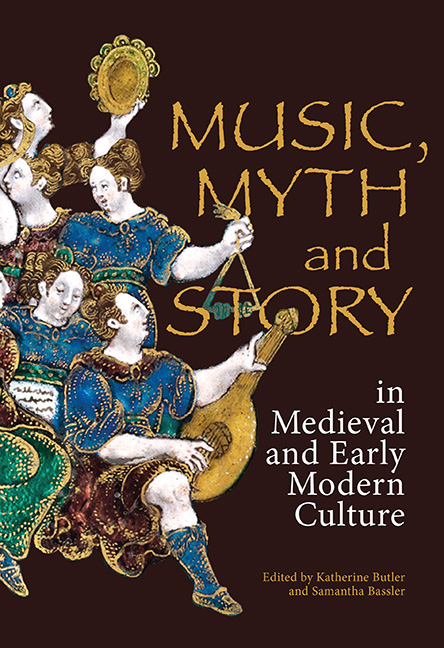Book contents
- Frontmatter
- Contents
- List of Illustrations
- List of Contributors
- Editors’ Note
- Introduction
- I MYTH IN MEDIEVAL MUSIC THEORY AND PHILOSOPHY
- 1 Music and the Myth of Apollo's Grove
- 2 The Consolation of Philosophy and the ‘Gentle’ Remedy of Music
- 3 And in England, There are Singers: Grafting Oneself into the Origins of Music
- II ICONOLOGIES OF MUSIC AND MYTH
- III MYTHS IN RENAISSANCE PHILOSOPHIES OF MUSIC
- IV MYTH AND MUSICAL PRACTICE
- V NARRATIVES OF PERFORMANCE
- VI MYTH AND MUSIC AS FORMS OF KNOWLEDGE
- VII RE-IMAGINING MYTHS AND STORIES FOR THE STAGE
- Bibliography
- Index
- Studies in Medieval and Renaissance Music
1 - Music and the Myth of Apollo's Grove
from I - MYTH IN MEDIEVAL MUSIC THEORY AND PHILOSOPHY
Published online by Cambridge University Press: 24 October 2019
- Frontmatter
- Contents
- List of Illustrations
- List of Contributors
- Editors’ Note
- Introduction
- I MYTH IN MEDIEVAL MUSIC THEORY AND PHILOSOPHY
- 1 Music and the Myth of Apollo's Grove
- 2 The Consolation of Philosophy and the ‘Gentle’ Remedy of Music
- 3 And in England, There are Singers: Grafting Oneself into the Origins of Music
- II ICONOLOGIES OF MUSIC AND MYTH
- III MYTHS IN RENAISSANCE PHILOSOPHIES OF MUSIC
- IV MYTH AND MUSICAL PRACTICE
- V NARRATIVES OF PERFORMANCE
- VI MYTH AND MUSIC AS FORMS OF KNOWLEDGE
- VII RE-IMAGINING MYTHS AND STORIES FOR THE STAGE
- Bibliography
- Index
- Studies in Medieval and Renaissance Music
Summary
THE myth of Apollo's sacred and mysterious grove is recounted by Martianus Capella (fl. fifth century) in the first book of De nuptiis Philologiae et Mecurii (The Marriage of Philology and Mercury). In Capella's allegorical narrative, which frames seven encyclopedic summaries of the liberal arts, the god Mercury, symbolising the Divine mind, weds Philology, a human maiden considered worthy of deification because of her intellectual accomplishments. Philology is commended to Mercury by the god Apollo, who then accompanies Mercury as he seeks final approval for the marriage from Jupiter. At the wedding, Mercury presents seven maidens who each expound one of the seven liberal arts. The scene depicting Apollo's grove, in which Mercury visits Apollo and the two set off for Olympus (De nuptiis, sections 11–29), is filled with musical references reinforcing foundational conceptions that persisted throughout the Middle Ages, namely that the structures of music point to the ordering of the physical universe and the soul's quest for God.
In Apollo's grove, Mercury encounters trees that resonate in proportions expressed in the Pythagorean sequence 12:9:8:6, and Mercury is told that it is appropriate that the grove of Apollo is so harmonious, because the Sun modulates the movements of the heavenly spheres. Also, in this narrative, Mercury must cross seven rivers symbolising the planetary orbits to approach Apollo, and he notes that many souls, making a similar transit, seem unnaturally captivated by the alluring melody of Venus. On their journey to Olympus, the gods Mercury and Apollo are joined by the nine Muses, who each ride a singing swan. Along the way, each Muse stops at the celestial sphere to which she is particularly attuned, e.g. Melpomene, Muse of Tragedy, with the Sun's orbit, and Calliope, Muse of Epic Poetry, with Mercury's, and so on.
Though prominent, the musical significance of the scene in Apollo's Grove is not limited to the so-called music of the spheres. For Neoplatonists, like Capella and those who read him in the Middle Ages, the order observed in carefully modulated musical harmonies pointed not only to the ordering of the cosmos, seen in the planetary movements, but also to the sort of ordering needed in each individual life, described metaphorically as the journey of a human soul to Earth, for birth in a physical body, a life well lived, and then a worthy return to the heavens at death.
- Type
- Chapter
- Information
- Publisher: Boydell & BrewerPrint publication year: 2019

